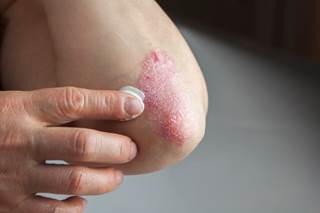February 22, 2019

Nearly nearly 50% of patients with psoriasis are not appropriately screened or treated for depression,
Significantly increased risks for depression and suicidality have been found in patients with psoriasis, although nearly 50% of this population is not recognized or identified by dermatologists, according to a letter published in Journal of the American Academy of Dermatology.
In this cross-sectional, anonymous survey study, 74 dermatologists based in the United States completed surveys online or in-person at dermatologic meetings, which included the 2018 American Academy of Dermatology Annual Meeting, the New York University Advances in Dermatology Symposium, and the monthly meetings of Dermatologic Society of Greater New York.
More than half (57%) of participants agreed or strongly agreed that there is an unfulfilled need for patients with psoriasis to undergo frequent monitoring for depression and suicidal ideation and behavior, but only 27% include questions about mood in the majority of clinical encounters. Of this amount, only 7% use a depression screening tool for asking about mood (mean score, 7.8±2.5), discussing depression (mean score, 7.4±2.5), and referring to mental health services (mean score, 8.2±2.3).
The mean score for asking about suicidal ideation and behavior was only 6.3±2.8. There was significantly increased comfort among physicians when asking and talking about depression and suicidal ideation and behavior when using a screening tool. The frequency of screening was positively correlated with comfort asking and talking about depression and suicidal ideation and behavior. Finally, there was also a significant positive correlation between the number of systemic medications prescribed by providers and screening frequency.
This study was limited by a relatively small sample size and reliance on self-reported assessments. There is potential for selection and non-response bias due to the level of motivation of responders to participate.
Psoriasis has been independently associated with major depression in the literature; this underscores the importance of being able to identify depression and SIB among patients with psoriasis. The findings of this study highlight an important knowledge and practice gap. The authors suggest that “[f]urther medical education on the available depression screening tools, such as the [Patient Health Questionnaire-2] and how to implement them into practice may help improve care and more completely address the needs of psoriasis patients.”
Dr Ho declared affiliation with the pharmaceutical industry. Please refer to reference for a complete list of disclosures.
Reference
Liang SE, Cohen JM, Ho RS. Screening for depression and suicidality in psoriasis patients: a survey of U.S. dermatologists [published online January 22, 2019]. J Am Acad Dermatol. doi: 10.1016/j.jaad.2019.01.025